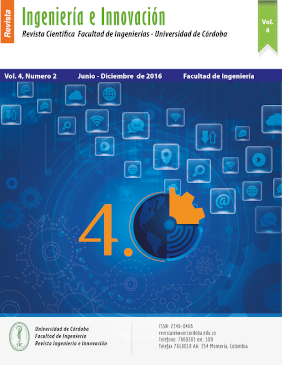Proposta de um algoritmo de recomendação usando uma rede bayesiana no health simulator
Proposta de um algoritmo de recomendação usando uma rede bayesiana no health simulator
How to Cite
Bez, M., M. Barros, P. R., Lima, A., Helwanger, F., & Reidel, D. (2016). Proposta de um algoritmo de recomendação usando uma rede bayesiana no health simulator. Ingeniería E Innovación, 4(2). https://doi.org/10.21897/23460466.1180
Dimensions
Show authors biography
Este artigo apresenta o projeto Health Simulator no contexto de inteligência artificial, no que se refere ao armazenamento do conhecimento especializado na área da saúde e estratégia pedagógica, que permite o auxílio ao aluno no seu processo de aprendizagem. Para tanto é apresentada a teoria de redes bayesianas, sistemas de recomendação, o projeto Health Simulator e a proposta de aplicação das técnicas utilizadas neste ambiente.
Article visits 513 | PDF visits
Downloads
Download data is not yet available.
- . M. BOTEZATU, H. HULT, U. G. FORS. Virtual patient simulation: what do students make of it? A focus group study. BMC Medical Education, v. 10, n. 91, 2010.
- . J. HIGGS, M. A. JONES, S. LOFTUS, H. CHRISTENSEN. Clinical reasoning in the health professions. 3.ed., China: Elsevier, 2008.
- . M. FORTE, W. L. de SOUZA, A. F. PRADO. Portfólio Eletrônico Ubíquo no Aprendizado de Medicina. In: Congresso Brasileiro de Informática em Saúde – CBIS, 12., 2010, Recife/PE. Anais do XII Congresso Brasileiro de Informática em Saúde – CBIS 2010, São Paulo: Sociedade Brasileira de Informática em Saúde, 2010, p.1-6.
- . S. D. BROOKFIELD. The power of critical theory: liberating adult learning and teaching. 1.ed., San Francisco: Jossey-Bass, 2005, 414p.
- . A. HOLZINGER, M. D. KICKMEIER-RUST, S. WASSERTHEURER, M. HESSINGER, M. Learning performance with interactive simulations in medical education: Lessons learned from results of learning complex physiological models with the HAEMOdynamics SIMulator. Computer & Education, v. 52, n. 2, p.292-301, 2009
- . S. J. SMITH, C. J. ROEHRS. High-fidelity simulation: Factor correlated with nursing student satisfaction and self-confidence. Nursing Education Perspectives, v. 30, n. 2, p.77-78, 2009.
- . P. R. BARROS, S. C. CAZELLA, M. B. BEZ, C. D. FLORES, A. DAHMER, J. B. MOSSMANN, J. M. FONSECA, V. MARONI. Um Simulador de Casos Clínicos Complexos no Processo de Aprendizagem em Saúde. RENOTE. Revista Novas Tecnologias na Educação, v. 12, p. 1-11, 2012.
- . A. ZIV, S. BEN-DAVID, M. ZIV, M. Simulation Based Medical Education: an opportunity to learn from errors. Medical Teacher, v. 27, n. 3, p.193-199, 2005.
- . J. P. KINCAID. Simulation in Education and Training. In: Modeling and Simulation: Theory and Applications, 1. ed., Boston: Kluwer, 2004, Cap.19, p. 273-280.
- . P. BRADLEY. The history of simulation in medical education and possible future directions. Medical Education, v. 40, n. 3, p.254-262, 2006.
- . S. RUSSELL, P. NORVIG. Artificial Intelligence: A modern approach. 3rd ed. New Jersey: Prentice-Hall. 1995. 1132 p.
- . R. L. MARQUES, I. DUTRA. Redes Bayesianas: o que são, para que servem, algoritmos e exemplos de aplicações. Coppe Sistemas – Universidade Federal do Rio de Janeiro, Rio de Janeiro, Brasil, 2002.
- . N. J. NILSSON. Artificial intelligence: a new synthesis. San Francisco: Morgan Kaufmann, 1998. 513 p.
- . W. WIEGERINCK, B. KAPPEN, W. BURGERS. Bayesian networks for expert systems: Theory and practical applications. In: Interactive collaborative information systems. Springer Berlin Heidelberg, 2010. p. 547-578.
- . L. J. SEIXAS et al. An architecture for an intelligent learning environment with a constructivist approach. ITS2002. San Sebastian, Spain. 2002.
- . M. R. FAZIO. Previsão de avaliações em sistemas de recomendação para nichos de mercado. Ph.D. Dissertation, COPPE, UFRJ, Rio de Janeiro, RJ, Brazil, 2013.
- . D. GOLDBERG, D. NICHOLS, B. M. OKI, D. TERRY. Using collaborative filtering to weave an information tapestry. Commun. ACM, vol. 35, no. 12, pp. 61-70, Dec. 1992.
- . G. R. LOPES. Avaliação e recomendação de colaborações em redes sociais acadêmicas. M.S. thesis, PPGC, UFRGS, Porto Alegre, RS, Brazil, 2012.
- . N. MANOUSELIS, H. DRACHSLER, R. VUORIKARI, H. HUMMEL, R. KOPER. Recommender systems in technology enhanced learning. In: Recommender Systems Handbook, 1st ed., F. Ricci, L. Rokach, B. Shapira, P. B. Kantor, Ed. New York: Springer, 2010, pp. 387 – 409.
- . G. G. TESTA. Uma abordagem híbrida para recomendação de parceiros em ambientes virtuais colaborativos de composição musical. Ph. D. dissertation, Prog. de Pós-Grad. em Comp., UFRGS, Porto Alegre, RS, Brazil, 2013.
- . A. S. LAMPROPOULOS, G. A. TSIHRINTZIS. Review of previous work related to recommender systems. In: Machine Learning Paradigms, Applications in Recommender Systems, 1st ed., New York: Springer, 2015, pp. 13 – 30.
- . B. SARWAR, G. KARYPIS, J. KONSTAN, J. RIEDL. Item-based collaborative filtering recommendation algorithms. In: Proceedings of the 10th International Conference on World Wide Web. ACM, pp. 285-295.
- . H. WU, Y. PEI, B. LI, Z. KANG, X. LIU, H. LI. Item recommendation in collaborative tagging systems via heuristic data fusion. Knowledge Based Systems, v. 75, pp. 124 – 140, Feb., 2015.
- . F. RICCI, L. ROKACH, B. SHAPIRA, P. B. KANTOR. Introduction to recommender systems handbook. In: Recommender systems handbook, 1st ed., New York: Springer, 2010, pp. 1 – 38.
- . K. I. GHAUTH, N. A. ABDULLAH. The effect of incorporating good learners’ ratings in e-Learning recommender system. Educational Technology & Society, v. 14, n. 2, pp. 248 – 257, Feb., 2012.
- . P. SCHUYTEMA. Design de Games: uma abordagem prática. São Paulo: Cengage Learning, 2008. p. 447.
- . V. JHA, S. DUFFY. ‘Ten golden rules’ for designing software in medical education: results from a formative evaluation of DIALOG. Med Teach. 24(4), 417–421. 2002. DOI: 10.1080/01421590220145798.
- . C. F. FLORES, J. M. FONSECA, M. R. BEZ, A. RESPÍCIO, H. COELHOMethod for Building a Medical Training Simulator with Bayesian Networks: SimDeCS. Studies in health technology and informatics, 207, 102-114. 2013.




